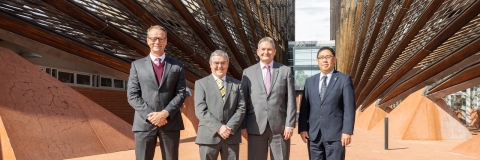
Jump to:
- Introduction
- Strategic Imperative 1 - Recruitment
- Strategic Imperative 2 - Student Experience
- Strategic Imperative 3 - Graduate Employment
- Strategic Imperative 4 - Research and Innovation
- University Budget 2022/23
- Graduation
- Celebrating our 30th Anniversary
- Bangladesh Minister Visit
- Dual Degrees with Edith Cowan University
- Menopause Guidance
- Recognition award for all staff
Introduction
Today is the 30th anniversary of our amazing institution becoming a University. In those years we have grown in depth and breadth, supporting thousands of students, delivering high impact research and benefiting our local communities. We have much to be proud of and I’m looking forward to the celebrations at our staff party later this month, and with our alumni in September.
July also means Graduation. I know this is a highlight of the year for so many staff as we celebrate with our students and their loved ones. Everyone in the University plays a role in helping our students succeed, whether they are teaching, delivering research, managing the estates, providing support and guidance to students, or completing essential activities that enable the University to run smoothly. Thank you for all you have done for our Class of 2022.
In this bulletin I reflect on our progress against our four key strategic imperatives. There is no doubt we continue to face challenges but there is also good news to celebrate such as our recent REF results and our improving Graduate Outcomes. Student satisfaction is also much better among our undergraduate, postgraduate taught and postgraduate research students as shown by recently published NSS, PTES and PRES surveys.
I also provide an update on our financial position. University finances are always complex and we are at the mercy of many factors we cannot directly control such as the continuing freeze of student fees and rising energy costs. This means we need to be smart with how we manage our financial position to enable us to mitigate the challenges where we can without compromising essential longer term strategic plans.
Our University may be on an island but we have an international outlook. I share my reflections this month on a recent visit to our partner institution Edith Cowan University in Perth, Western Australia and a visit to Portsmouth by the Bangladesh Foreign Minister. Visits such as this seemed impossible only a year ago. Zoom is great but meeting in person cannot be surpassed in deepening these important relationships.
This is my final bulletin for this academic year and as we close out another year it's a natural point for reflection. It feels quite an achievement to have made it through this year without a covid lockdown or an incident such as the cyber attack!
Do take time to look back on the year and be proud of all of your achievements - there are many. I hope that you will be able to take a much needed and deserved break over the summer, recharge your batteries and spend time with loved ones.
Strategic Imperative 1 - Recruitment
The student recruitment market remains challenging for us as we seek to reverse the ongoing decline in applications and boost conversions. This will very likely mean that clearing is particularly important to us as we try to reach our recruitment targets. I know that many of you have been involved and continue to be involved with this and I would like to thank all of you as I recognise this is an institutional effort with it being vital for us that we meet all our student recruitment targets.
More positively, international student interest continues to be buoyant and our recruitment targets in this area have increased which will compensate to a certain extent the difficulties we are facing with recruiting home students.
There was also a boost this week with good numbers attending our recent open days on Saturday and yesterday. The Saturday open day was particularly successful with 1,223 attending, which is a return to pre-pandemic attendance numbers. A number of campus enhancements were made including entertainers, performers, chill out zones with barbecues and deckchairs, plus additional greenery and plantings to make the campus as attractive as possible. However, these open day numbers will not necessarily affect the numbers of students starting in September 2022 as these will be applicants for 2023 onwards, but it is important for us to provide the best impression we can to potential applicants and their parents. It does, however, show there is good interest in choosing Portsmouth as a university. As always, the challenge will be to convert this interest into applications, and I know we are all focused on achieving this.
Strategic Imperative 2 - Student Experience
Yesterday you would have read about our excellent National Student Survey (NSS) results which showed we are now ranked 39th of universities in England for full and part time student satisfaction in the National Student Survey (NSS). 78% of all 2022 final year undergraduates were satisfied overall with their university experience, compared to 71% last year. In comparison the sector has risen from 75% last year to 76% this year, which means that on average our students say they have a better experience at Portsmouth than peers at most universities.
These overall results are satisfying and reflect the hard work by our people across the whole university in improving the student experience this year. There continues to be quite significant variation in experience at course level, ranging from above 90% for twelve courses to below 50% for two courses. Reducing this variability and ensuring that all students have the positive experience they can expect from Portsmouth will continue to be a key imperative in the coming year.
And student satisfaction among our postgraduates students has also shown an improvement. In the Postgraduate Taught Experience Survey (PTES) 86% of our students were satisfied overall with the quality of the course - up 3% from 2021. 87% would recommend the University to a friend interested in completing a postgraduate degree, which is a rise of 4% from 2021. And 90% said ‘staff are good at explaining things' which is a 2% rise from last year.
Further benchmarkable PTES data will be published later in July which will provide greater context about our relative position to other universities.
The national survey for PhD and other PGR students, the Postgraduate Research Experience Survey (PRES) have also released their interim results and these show for satisfaction with the overall experience of their research degree, that Portsmouth students (82% agree) were, yet again, above the national average (80%). Portsmouth also continues to produce good response rates, with more than half of our students (52%) responding compared to 31% nationally. Portsmouth also continues to have higher satisfaction with the skills and knowledge of our supervisors (89%) compared to the sector as a whole (88%). Our inductions, training and other development programmes also continue to be very highly rated compared to the sector, including for satisfaction for our PGR teaching training courses, which achieved a satisfaction rate of 82% compared to 63% in the sector as a whole.
The full PRES data set and analysis will be released by the Advance HE survey team later in July.
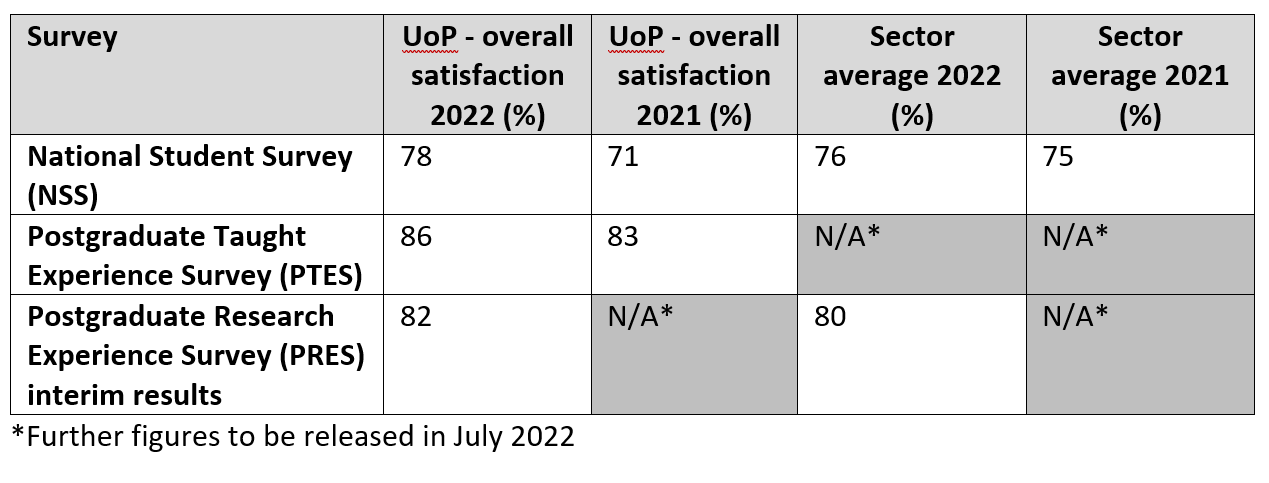
Strategic Imperative 3 - Graduate Employment
We are focused on rapidly improving our graduate employment and the recent Graduate Outcomes results make for good reading. The survey is based on responses from our summer 2020 graduates who are interviewed 15 months after they graduated.
I'm pleased to share that Portsmouth's improvements this year have outpaced the sector following the impact of Covid in the previous year's survey. For 'percentage in work and/or further study', we have improved from 90% to 94%. When ranked against the main 121 universities in the UK, we have moved from 97th place to 47th place in this metric - an improvement of 50 places!
For 'percentage in highly skilled employment', we have improved from 64% to 69%. Again, when ranked against the main 121 universities in the UK, we have moved from 79th place to 62nd place in this metric, up 17 places. After the difficult two years just gone, these figures show that all of our focus on improving outcomes for our graduates is starting to have an impact and this is reflected in the results. Thank you for your commitment and hard work in this area - we must keep it up.
Strategic Imperative 4 - Research and Innovation
Following on from our excellent REF results back in May when we were ranked third of all modern post-92 UK universities for research power, more detailed analyses have begun to help us consolidate our gains and make improvements in some areas to realise our ambitions. We are currently inviting contributions for our Festival of Research and Innovation on 4 November which is an opportunity to bring our community together to share, showcase and celebrate our activities.
Becoming a strong research institution has multiple benefits, including improving graduate employment through student enterprise. For this reason I am delighted to see our students and graduates perform so strongly in the National Ingenuity Competition. With over 700 applications from 39 UK universities, it is great to see Emma Kemp, a recent Portsmouth Alumna awarded the prize of Ingenuity Climate Champion, the South Coast Champion and win the Shakespeare Martineau Legal Prize, for her company Love Outdoors. Love Outdoors helps people overcome barriers to getting outside, improving mental and physical health, and re-engage with nature by highlighting free and accessible outdoor activity locations.
I am particularly pleased that last week we welcomed a group of visiting scholars from a range of Global South nations to the University to explore collaborations across topics ranging from marine ecology and quantum physics to international trade. Their visit was paid for by Research England Enhancing Research Culture funding.
Building and supporting our research and innovation community is also incredibly important to us, and the next rounds of our successful R&I Leadership Programmes are now open for applicants. You can find out more through the RIS staff development webpages.
University Budget 2022/23
Yesterday the Board of Governors approved the University Budget for 2022/23. This projects a deficit of £21 million. For context our total income is budgeted to be £292 million, meaning our deficit is 7.2% of the total.
Firstly it’s important to say we are in a position of financial strength, which allows us to plan for a deficit budget in 2022/23 with a smaller deficit in 2023/24 and a breakeven position projected in 2024/25 before returning to a surplus in the following years. This enables ongoing investment to address our key strategic imperatives to continue.
The deficit is primarily caused by the shortfall in home full-time undergraduate student recruitment in 2021/22, which continues into 2022/23, 2023/24 and, to a lesser extent, 2024/25, due to lower student numbers on these three or four year long courses. This is exacerbated by the continuing freeze on home full-time undergraduate tuition fees which is now costing the University around £5 million per year in real terms on a cumulative basis. Finally, the very high rates of inflation and increased energy bills currently being experienced are a further challenge for the institution as well as personally to University colleagues in our daily shop.
Of course our aim is to return to a surplus position as rapidly as possible, while ensuring we don't take short term decisions that inadvertently compromise the longer-term strategic and financial sustainability of the University. This will be a fine balance, with the need to ensure as much ongoing investment as possible to support the delivery of our Vision 2030 and Strategy 2025, while ensuring our financial sustainability through a mix of cost reduction and growth in surplus generating income. I will provide more information on our plans in this area in future bulletins.
I’m often asked why efficiencies are needed if we are financially strong. In simple terms, our accumulated cash balances are a mixture of the loan, which is not yet spent, plus cash that has been accumulated because we haven't been spending rapidly enough on our estate and other ambitions. And changes to budget should be regarded as opportunities to improve our processes, to streamline our activities and make sure everything we do delivers value for money. They must also future-proof us against changes in demand.
No doubt, there will be challenges but other universities are in a similar or in some cases much more difficult position than us. Our financial strength does mean we can manage the coming three year period in a planned and measured way.
Graduation
Graduation is nearly upon us. For many of us involved it will be an incredibly busy period but overwhelmingly the feeling will be of joy and pride as the class of 2022 receive their certificates and celebrate their achievements with family, friends, staff and fellow students.
Last year was our biggest ever Graduation - and this year will be of a similar scale with more than 7,700 students graduating at 37 ceremonies over two weeks in the Guildhall starting Monday (11 July). That’s a lot of hands to shake!
We will also host three virtual ceremonies on Wednesday (20 July) which were initially introduced as a result of Covid but have proved to be a popular option for many - particularly international and distance learning students. And these will all take place in our 30th year as a university which will add to the celebrations.
This year we are taking a sustainable approach to align graduation with our climate-positive strategic aims, by having each of our graduation gowns made from 70% recycled polyester which is manufactured from recycled plastic waste. This will be reflected in our celebratory receptions which are held in Ravelin Park where vegan canapes will be served on reclaimed slates to further reduce our carbon footprint. Finally, our gowning supplier engages in a number of carbon offsetting schemes around the world.
I know many colleagues are involved in Graduation, and I’d like to thank you for your help in bringing these large, complex events to fruition. If you’re not directly involved in the ceremonies, I would recommend watching the ceremonies broadcast live on the University’s YouTube channel and spend a few moments in Guildhall Square during Graduation as it’s a fantastic atmosphere and a testimony to all of our hard work - to deliver the very best for our students.
Celebrating our 30th Anniversary
30 years ago today we became a university. On 7 July 1992 Portsmouth Polytechnic became the University of Portsmouth during an inauguration ceremony at Portsmouth Guildhall. It was a very busy day in 1992 with multiple processions, a thanksgiving ceremony at St Thomas's Cathedral in Old Portsmouth, fireworks, and a lunch, tea and a dusk til dawn inaugural ball in Ravelin Park with ‘breakfast available for early morning revellers’ according to the invitation. This article complete with archive photos makes for fascinating reading to what it was like 30 years ago.
We will be celebrating the anniversary at the Staff Party on 28 July. I’d encourage as many of you as possible to come along as some of us may not have seen one another in person socially for a very long time. There will be music, drinks, food and a chance to explore and enjoy the extensive improvements to Ravelin Park.
In September, alumni will be welcomed back to campus to celebrate the anniversary as part of a Reunion Weekend for University, Polytechnic and predecessor institution graduates. If you are an alum, consider becoming an Alumni Reunion Ambassador and bringing a group of classmates and friends together for this very special event. I hope you will all join us for this historic occasion and spread the word to your family and friends who are Portsmouth grads. Email alumni@port.ac.uk to find out more.
Bangladesh Minister Visit
Last week we welcomed the Bangladesh Foreign Minister to the city and university. The Honourable Professor Dr A.K Abdul Momen met with local businesses, the Lord Mayor and gave a public talk on Peace and Diplomacy in the Eldon Building.
The visit builds on progress made during the City Council and University's 2019 Trade Mission to Bangladesh, when Portsmouth became a sister city with Sylhet in eastern Bangladesh. Since then, the city and the university have become established in the minds of key decision makers, institutions and organisations in Bangladesh.
Since the trade visit in 2019, we have undertaken a number of activities, including opening offices in Dhaka and establishing strong working relationships with the Portsmouth Bangladesh Business Association and local Bangladeshi community, which has resulted in over 400 students from Bangladesh now studying at our university.
While the visit was very positive and will strengthen our relationships, it came among the tragic backdrop of deadly flooding in Sylhet. Our thoughts are with everyone affected.

Visit to Guildhall Square
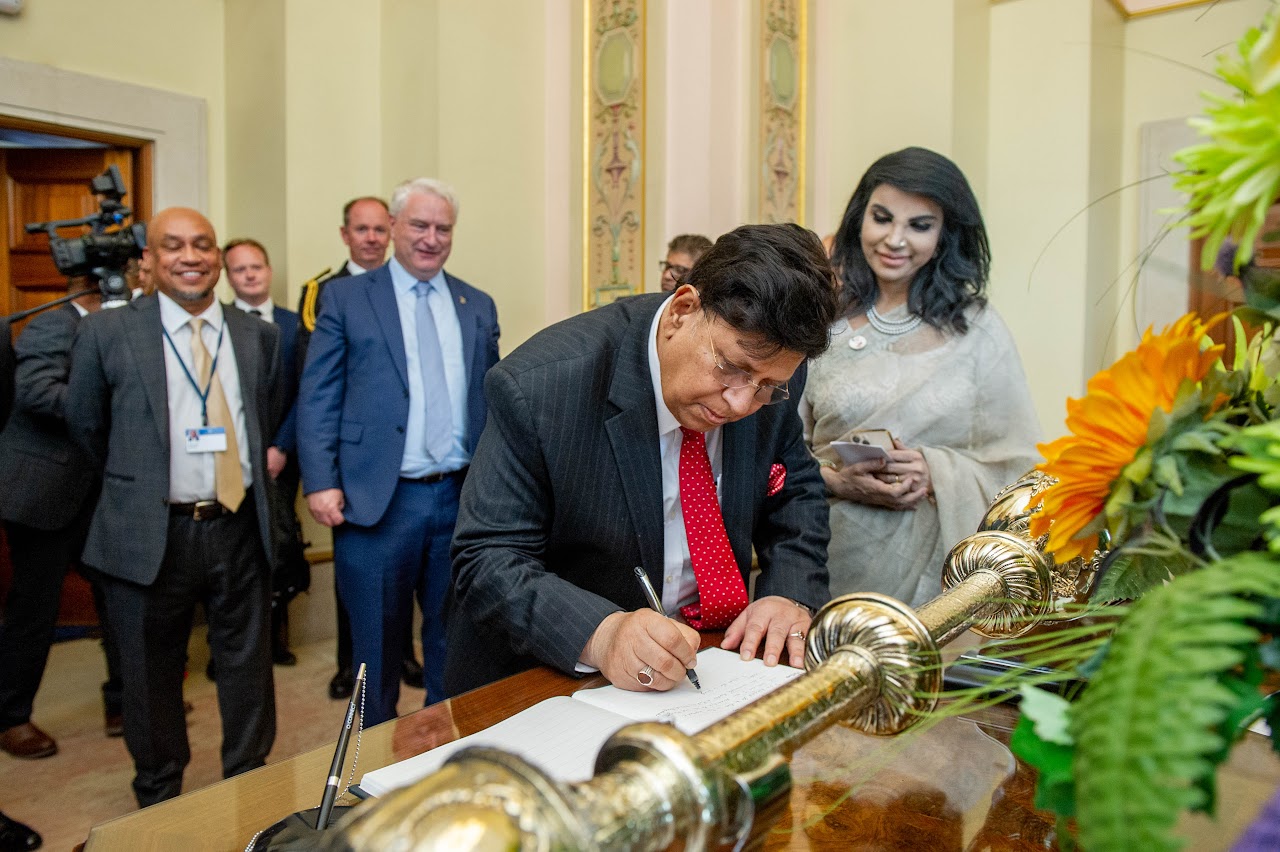
Dual Degrees with Edith Cowan University
In May, together with Chris Chang, I visited the campus of our strategic partner Edith Cowan University (ECU) in Perth, Western Australia. Both institutions share a commitment to support students’ development as global citizens and have partnered to develop a distinctive suite of undergraduate dual degrees. These degrees go further than simply the provision of opportunities for students to study abroad, they offer a new model of internationalisation that builds on the strengths of both institutions.
This collaboration has seen the establishment of a shared governance structure and the co-design of four programmes that give students the opportunity to receive two degree awards, one from each university. Students have the benefit of studying the complimentary curricula of both institutions across two countries and experience the teaching expertise, latest research and facilities of each institution. I had the opportunity to meet students who will come to Portsmouth in January 2024, after spending their first two years in Australia and with such a fantastic offer, we even managed to sign up another student on the spot!
I'm delighted that this partnership has brought the academic and student community together across both institutions, expanding the reach of our current exchange provision, catalysing multiple international projects and enabling us to share best practice. For example, as part of the UK-Australia Season we co-hosted a virtual exchange programme for 105 students and four public events, bringing together university researchers, civil society leaders, and industry experts to debate and discuss big picture questions facing their disciplinary areas in the context of the UN Sustainable Development Goals. There are two more dual degrees in development, and we aim to see 500 students registered across all programmes by 2025, meeting both institutions’ ambitions.
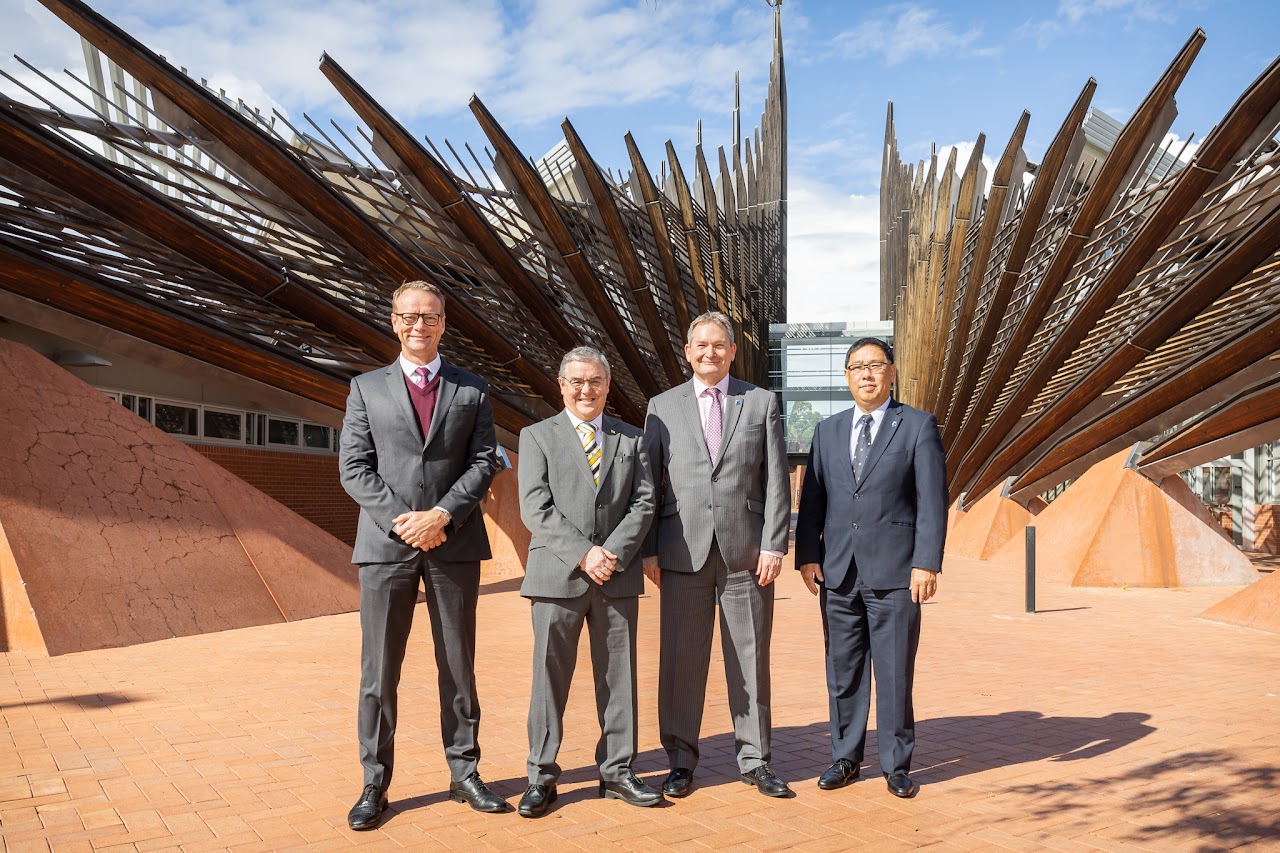
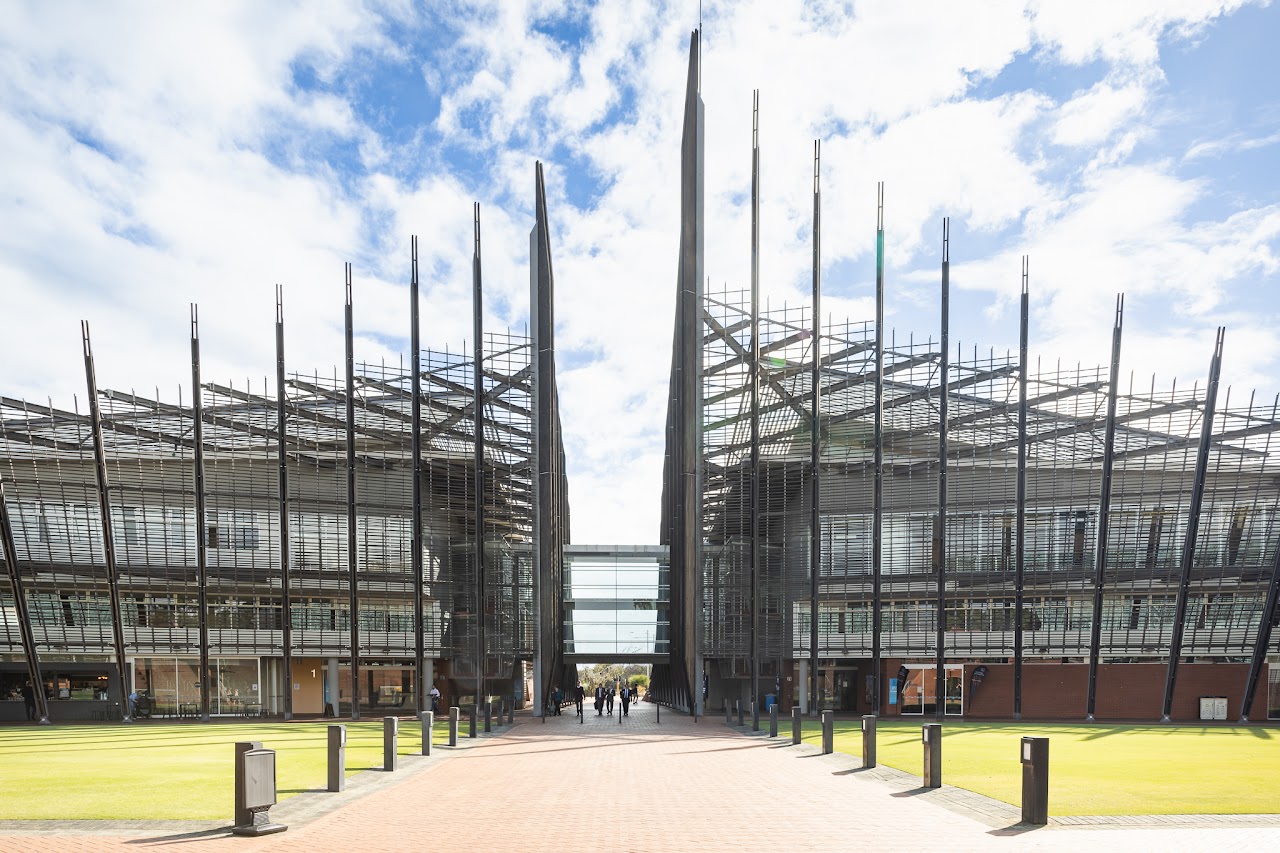
Menopause Guidance
I am delighted to share with you our newly developed Menopause Guidance which will form part of an overarching Staff Wellbeing Policy. The University is committed to equality, diversity and inclusion and this guidance will support all colleagues in creating an inclusive environment to raise issues in relation to the menopause. It will educate our people managers and give them confidence to have conversations about the menopause and raise awareness. It will give our colleagues experiencing menopausal symptoms information about support available at the University together with signposting of external organisations who can offer further advice and guidance. We have now committed our support externally by signing the Menopause Workplace Pledge and will take positive action to make sure everyone experiencing the menopause is appropriately supported.
The Menopause Guidance can be found on our HR page and further e:learning is available using your UoP login. We will also be running a series of events on 18 October to recognise National Menopause Day with further information being shared closer to the time.
Recognition award for all staff
I am very conscious of how incredibly hard all colleagues have worked over the past year at a time when inflation is putting a strain on personal finances. Colleagues have worked above and beyond what is normally expected and as a senior team we are very grateful. I am very pleased to say that thanks to your hard work our end of year position is far more positive than we had anticipated. While we do clearly as a University remain in financially uncertain times, and continue to look at ways in which we can create longer-term financial sustainability, I think it is important to recognise the great work you have done.
We are of course part of and bound by the collective bargaining process that sets wage levels each year, but outside of this process which is on-going, I wish to recognise this huge effort and commitment by making a one-off payment of £750, which will be paid pro-rata by FTE for the 12-month period 1 August 2021 - 31 July 2022. This payment will not be pensionable. Colleagues on PTHP, variable hours and casual contracts will be eligible and those who recently joined the University will also receive the full payment, subject to their FTE. This will be paid in this month’s salary.
This is only possible because of our better than anticipated financial position during this current year and I do hope that it will help to ease the financial pressures you are facing and enable a better than anticipated break over the summer period.
I do wish you all the best for a well-deserved and enjoyable summer.